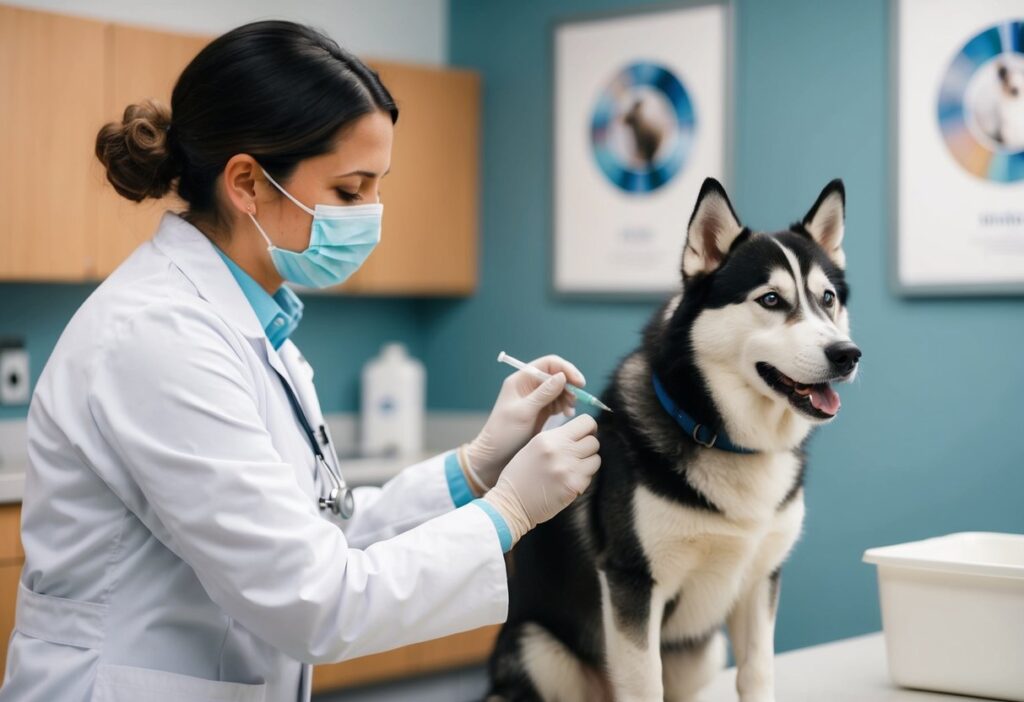Keeping your Siberian Husky puppy healthy starts with a proper vaccination schedule. Puppies need several rounds of shots to build immunity against dangerous diseases.
A typical husky vaccination schedule includes core vaccines at 6-8 weeks, 10-12 weeks, and 14-16 weeks of age. These shots protect against common illnesses like distemper, parvovirus, and hepatitis.
Rabies vaccines are also crucial for huskies. Most states require rabies shots between 12-24 weeks old.

Your vet will guide you on the exact timing based on local laws. After the initial puppy series, adult huskies need regular booster shots to maintain protection.
Working with your veterinarian is key to creating the right vaccine plan for your husky. They can advise on optional vaccines that may benefit your dog based on lifestyle and risk factors. Sticking to the recommended schedule helps keep your furry friend safe and healthy for years to come.
Key Takeaways
- Husky puppies need core vaccines at 6-8, 10-12, and 14-16 weeks old
- Rabies vaccines are required by law, usually given between 12-24 weeks
- Regular booster shots maintain immunity in adult huskies
Understanding Core Vs. Non-Core Vaccines
Vaccines for huskies fall into two main groups: core and non-core. Core vaccines protect against serious, common diseases. Non-core vaccines target other risks based on a dog’s lifestyle.
Core Vaccines for Your Husky
Core vaccines are vital for all huskies. They guard against distemper, parvovirus, adenovirus, and rabies. These diseases can be deadly or cause severe illness.
Distemper affects the nervous system and can be fatal. Parvovirus attacks the gut and is often deadly in puppies. Adenovirus causes liver damage. Rabies is always fatal and can spread to humans.
Vets give these shots in a set schedule. Puppies need a series of shots. Adult dogs get boosters every 1-3 years.
Non-Core Vaccines and Lifestyle Factors
Non-core vaccines protect against other diseases. The need for these depends on where you live and your husky’s activities.
Leptospirosis is one example. This disease spreads through water and soil. Huskies who swim or hike may need this shot.
Other non-core vaccines guard against kennel cough, Lyme disease, and canine influenza. Talk to your vet about which ones your husky needs.
Your vet will look at your dog’s age, health, and habits. They’ll help you choose the right mix of vaccines to keep your husky safe.
Husky Puppy Vaccination Checklist
- 6-8 Weeks: DHPP Vaccine: Protects against Distemper, Hepatitis (Adenovirus), Parainfluenza, and Parvovirus.
- 10-12 Weeks: DHPP Booster: A second dose to strengthen immunity.
- 14-16 Weeks: DHPP Booster: A third dose for long-term protection.
- 12-24 Weeks: Rabies Vaccine: Protects against rabies, required by law in most states.
Non-Core Vaccinations
- Leptospirosis Vaccine: Recommended if your puppy swims or spends time in areas with standing water or wildlife.
- Bordetella (Kennel Cough) Vaccine: Needed if your puppy is boarded, goes to daycare, or frequently visits dog parks.
- Lyme Disease Vaccine: Consider this if your Husky is exposed to ticks, particularly in wooded or grassy areas.
- Canine Influenza Vaccine: Suggested if your puppy is around many other dogs, such as in travel or boarding situations.
Booster Shots
- 1 Year: DHPP Booster to maintain immunity against core diseases.
- Rabies Booster: Follow local laws (often given every 1-3 years).
Adult Husky Vaccinations
- Every 1-3 Years: DHPP and Rabies, depending on local laws and your vet’s recommendations.
- Annually: Optional non-core vaccines like Leptospirosis, Bordetella, Lyme Disease, or Canine Influenza (depending on exposure risk).
Titer Testing
- Consider titer tests to check your Husky’s immunity levels before administering boosters. This can help avoid over-vaccination.
Husky Puppy Vaccination Schedule
Husky puppies need a series of shots to stay healthy. The schedule starts when they are young and continues as they grow. Proper timing is key for the best protection.
Initial Puppy Shots and Timelines
Husky puppies should get their first shots at 6-8 weeks old. This usually includes the DHPP vaccine, which protects against distemper, hepatitis, parainfluenza, and parvovirus. Vets give this shot every 2-4 weeks until the puppy is 16 weeks old.
At 12-16 weeks, puppies often get their first rabies shot. Some areas have laws about when this must happen. The vet may also suggest other shots based on where you live and your puppy’s health.
It’s best to stick to the schedule the vet gives you. Missing shots can leave your puppy at risk for serious illnesses.
Booster Shots for Continued Protection
After the first year, Husky puppies need booster shots to keep their protection strong. The vet will give the DHPP shot again at 1 year old. They also need another rabies shot at this time.
From then on, adult Huskies usually get DHPP shots every 1-3 years. Rabies shots are often given every 1-3 years too, based on local laws.
The vet might suggest other shots depending on your dog’s lifestyle. For example, dogs that spend time in kennels may need a shot for kennel cough. Always talk to your vet about which shots are right for your Husky.
Adult Husky Vaccination and Maintenance

Adult huskies need regular vaccines and health checks to stay healthy. Vets can tailor shots based on a husky’s age and lifestyle.
Annual Boosters and Health Checks
Adult huskies should visit the vet once a year for check-ups and shots. Core vaccines like rabies, distemper, and parvovirus are often given yearly. Some vets may suggest a 3-year plan for certain shots.
Bordetella and canine influenza vaccines may be needed for dogs that go to daycare or board often. These protect against common kennel illnesses.
Yearly visits also let vets check for health issues. They can spot problems early and give advice on diet and exercise.
Assessing Vaccine Needs as Your Husky Ages
As huskies get older, their vaccine needs may change. Vets might suggest fewer shots based on the dog’s health and lifestyle.
Titer tests can check if a husky still has protection from past vaccines. This blood test measures antibody levels. If levels are high, some shots may be skipped that year.
Older huskies may need more focus on health issues like joint pain or heart health. Vets might spend more time on exams and less on vaccines.
It’s key to talk with your vet about your husky’s specific needs. They can create a plan that keeps your dog healthy without over-vaccinating.
Recognizing and Managing Vaccination Risks

Vaccinations help protect huskies from serious diseases. But like any medical treatment, they can have some risks. It’s important to know what to watch for after shots and how to avoid giving too many vaccines.
Common Side Effects and Adverse Reactions
Most huskies handle vaccines well. Some might feel a bit tired or sore for a day or two. This is normal. A small bump may form at the injection site. It should go away in a week or so.
More serious reactions are rare but can happen. Signs to watch for include:
- Fever
- Vomiting or diarrhea
- Swelling of the face or legs
- Trouble breathing
- Collapse
If you see these signs, call your vet right away. They can give medicine to help your husky feel better.
Over-Vaccination Concerns and Titer Testing
Giving too many vaccines can be harmful. Some vets now use blood tests called titers to check if a dog needs shots. These tests measure antibodies from past vaccines.
If antibody levels are high, your husky may not need a booster. This can help avoid extra shots. Titers are most often used for core vaccines like:
- Parvovirus
- Distemper
- Adenovirus
Talk to your vet about using titer tests for your husky. They can help decide the best vaccine plan. This may mean fewer shots while still keeping your dog safe from disease.
Navigating Additional Vaccinations
Your husky may need extra shots beyond the core vaccines. These optional vaccines protect against specific risks based on lifestyle and location.
Optional Vaccines Tailored to Your Husky’s Exposure
Kennel cough vaccines are smart for social huskies. The Bordetella shot guards against this contagious cough. It’s a must for dogs that board, go to daycare, or visit dog parks often.
Lyme disease vaccines help huskies in tick-heavy areas. This shot wards off the illness spread by ticks. Ask your vet if it’s needed based on where you live and your dog’s outdoor time.
Canine influenza shots protect against dog flu. This vaccine is good for huskies that travel or spend time in crowded dog areas.
Travel and Region-Specific Vaccines
Some places have unique health risks for dogs. Your husky might need extra shots if you move or travel.
Check with your local vet about regional threats. They know what’s common in your area. For example, huskies in the Southwest might need rattlesnake vaccines.
If you plan to travel, research vaccine rules for your destination. Some countries require proof of certain shots. Start this process early, as some vaccines need time to take effect.
Remember, your vet is the best guide for your husky’s vaccine needs. They can create a plan that fits your dog’s lifestyle and keeps them safe.
Trusted Sources (USA)
1. American Veterinary Medical Association (AVMA)
- Website: avma.org
- The AVMA is one of the leading authorities on veterinary medicine in the USA. They offer guidelines on vaccination schedules, vaccine safety, and updates on best practices for pet health.
2. American Animal Hospital Association (AAHA)
- Website: aaha.org
- The AAHA publishes regularly updated guidelines for canine vaccinations, including core and non-core vaccines. Their recommendations are widely followed by veterinarians across the USA.
3. Centers for Disease Control and Prevention (CDC)
- Website: cdc.gov
- While the CDC focuses on public health, they provide information about zoonotic diseases, such as rabies, and the importance of vaccinations in preventing disease transmission between pets and humans.
4. World Small Animal Veterinary Association (WSAVA)
- Website: wsava.org
- The WSAVA is a global authority but offers widely accepted vaccination guidelines that are frequently used by veterinarians in the USA.
5. Banfield Pet Hospital
- Website: banfield.com
- Banfield is one of the largest veterinary chains in the USA, offering vaccination services. They have their own wellness plans, which include regular vaccinations.
6. VCA Animal Hospitals
- Website: vcahospitals.com
- VCA is another large veterinary chain that offers standardized vaccination services and is widely trusted for pet care across the country.
7. Local Veterinary Clinics
- Most private veterinary clinics across the USA follow the guidelines set by organizations like the AVMA and AAHA. It’s always good to check


Leave a Reply